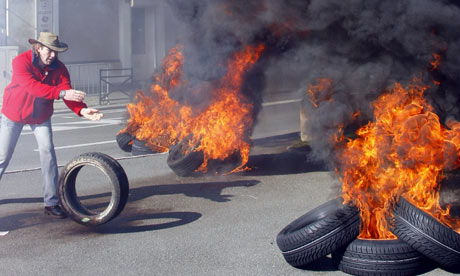
Continental employees burn tyres during a demonstration in Compiègne, north of Paris Photograph: Michel Spingler/AP
More than a million angry French workers took to the streets Thursday in a nationwide strike to force President Nicolas Sarkozy to boost wages and protect jobs as the economic crisis deepens.
“Sarkozy has to take from the billionaires and give a bit back to the poor,” said teacher Jean-Baptiste Voltuain, echoing mounting calls for the right-wing government to boost social spending by hiking taxes on the rich.
Voltuain was one of the marchers at a rally in Paris which was fronted by the leaders of France’s eight main unions as it snaked its way through the east of the city in warm spring sunshine.
The CGT union said three million people took part in protests across the country, but police put the number at 1.2 million.
Related articles:
– France braced for huge street protests over economic crisis (Guardian)
– Sarkozy warned of ‘class war’ (Financial Times)
A million civil servants went on strike, officials said, while protestors from both public and private sectors marched in the capital and in Marseille, Lyon, Strasbourg and around 200 other towns.
Riot police used tear gas to disperse about 200 youths who threw stones and other objects and lit fires in the street as the Paris march came to an end at Place de la Nation.
In Toulouse, police used batons and flashballs to disperse around 200 protestors who threw bottles and set fire to rubbish bins in the southwestern city. One officer was slightly injured.
Protestors smashed windows at the MEDEF employers’ federation in Rouen in the north.
But mostly the one-day strike, which polls say had the support of nearly 80 percent of the French, was peaceful.
Strike action sparked flight cancellations in Paris’s Orly airport, but most flights out of the main Charles de Gaulle airport went ahead, officials said.
Rail operator SNCF cancelled 40 percent of high-speed TGV services and half of other regional trains. Paris commuters were spared major disruption due to a new law enforcing a minimum service during strikes.
France is less badly hit than many of its European neighbours by the economic storm, but public anger is mounting as the country feels the bite of a recession set to last well into 2010.
Many fear for their jobs, with two million already unemployed and 350,000 more layoffs expected this year.
The left-wing daily Liberation said the protesters were indignant “at the absurdity of (Sarkozy’s) economic stimulus plan that does not stimulate very much and whose essentials don’t benefit workers but businesses.”
“I have two kids, a mortgage,” said Maher Khedira, 45, an engineer with car parts supplier Faurecia, a Peugeot subsidiary that is slashing hundreds of jobs across France this year.
“I moved house to be nearer my job and now it looks like I might lose it,” he said as he marched in Paris, while around him protestors blew whistles and chanted anti-employer slogans.
In Compiegne, north of Paris, workers burned tyres to protest over the closure of a German-owned Continental tyre plant with the loss of 1,120 jobs, the latest in a wave of factory shutdowns.
Unions want Sarkozy to hike the minimum wage, increase taxes on the rich and scrap plans to cut public sector jobs.
“The government has to go further,” said Francois Chereque, leader of the CFDT union, as he marched in Paris.
Opposition Socialist Party leader Martine Aubry said “the crisis is deepening in our country and for months we have been telling the president that we need a real stimulus package.”
Sarkozy agreed last month to a package of social benefits worth 2.6 billion euros after a first day of mass protests brought a million people onto the streets on January 29.
That came after he announced a 26-billion-euro stimulus plan aimed at business investment.
But his right-wing government has ruled out any new social spending.
It says its priority is to protect jobs and industry, and it has rejected mounting calls to suspend an unpopular cap on income tax attacked as a handout to the rich.
Seeking to deflect public anger, the government has called on the MEDEF federation to cap executive pay at firms that announce layoffs. But it flatly rejected the suggestion.
Authorities fear that a tough six-week strike on the French Caribbean island of Guadeloupe, which ended with a deal to hike wages, could embolden workers on the mainland to take a more radical stance.
Polls suggest the crisis is already benefiting the extreme-left leader Olivier Besancenot, whose newly-launched Anti-Capitalist Party (NPA) is named in recent surveys as the most credible alternative to Sarkozy’s government.
Published: Thursday March 19, 2009
Source: AFP